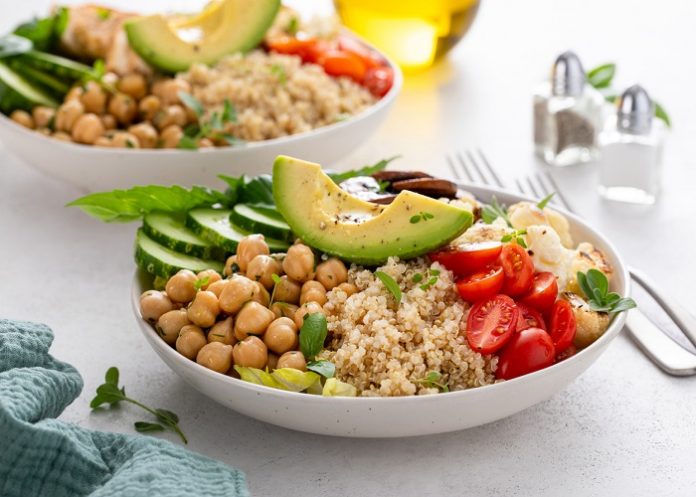Recent evidence from a study by American researchers has reinforced the conclusions that diets packed with veggies and fruit are are strongly associated with benefits that include everything from better sleep to healthier hearts, brains, bowels and immune systems.
Their new analysis adds to growing evidence that veganism and vegetarianism lower the risk of some cancers.
“This is all relatively unique information and possibly the most robust …concerning cancers such as stomach and lymphoma,” said study lead author Gary Fraser, an epidemiologist from Loma Linda University in the United States.
Fraser and colleagues compared medical data from 79 468 Seventh-Day Adventists who lived in the US and Canada between 2002 and 2007. Initially free of cancer, a percentage of individuals would go on to contract various forms of the disease, according to follow-up reports collected until 2015.
“Many of those non-vegetarian Adventist people in this study were still very health-conscious people, so in some ways, it’s amazing that we found anything at all,” said Fraser.
Incredibly, the vegetarians were 45% less likely to develop stomach cancer in the period studied, and 25% less likely to have lymphomas. The overall reduced risk of all cancers was 12%.
“These data indicate a lower risk in vegetarians for all cancers combined, as well as for medium-frequency cancers as a group,” the researchers wrote in their paper, published in the American Journal of Clinical Nutrition.
It makes sense that the clearest impacts would be seen in the gastrointestinal system, the team noted.
“These organs have direct contact with foods and their breakdown products during digestion and other derived metabolites that are provided by the actions of gut bacteria.
“Processed meats are accepted as risk factors for both of these sites, and for stomach cancer also, higher intakes of fruits (especially citrus), grilled and barbecued fish and meats, and vegetables probably confer protection.”
Diet did not, however, seem to convey any protection from other types of cancers, including those that impact the urinary tract or nervous system, Fraser noted.
“It may also be pointing the finger at several other cancers – such as lung, ovary, and pancreas,” he said. “The evidence from this study was suggestive of lower risk in vegetarians, but did not quite reach the necessary standard to say more.”
Although this is a large study spanning a long period, it can only provide evidence for trends, as opposed to causes. So it may well be that those who are choosing to avoid animal products are also more likely to make other decisions that have a positive impact on their health as well, like exercising more, which is also associated with better outcomes when it comes to cancer.
The focus on Seventh-Day Adventists helps somewhat account for this limitation, as religious followers tend to put a strong emphasis on healthiness.
It’s also important to keep in mind that taking any diet too far can lead to health problems, too. Vegetarian diets can lead to nutrient deficiencies if not executed correctly. This can be a lot harder to do for people living in less wealthy areas and more likely to be surrounded by food deserts or swamped by unhealthy options.
What’s more, vegetarianism can be extremely difficult for those with dietary health conditions to achieve. For these reasons, researchers often emphasise that including more vegetables in a diet, rather than becoming strictly vegan, is the most important takeaway from all these studies.
Study details
Longitudinal associations between vegetarian dietary habits and site-specific cancers in the Adventist Health Study-2 North American cohort
Gary Fraser, Fayth Butler, David Shavlik et al.
Published in Journal of Clinical Depression in August 2025
Abstract
Background
Associations between vegetarian diets and risk of common cancers are somewhat understood, but such data on medium-frequency cancers are scarce and often imprecise.
Objectives
The objectives of this study was to describe multivariable-adjusted associations between different types of vegetarian diets (compared with non-vegetarians) and risk of cancers at different bodily sites.
Methods
The Adventist Health Study is a cohort of 95 863 North American Seventh-Day Adventists established between 2002 and 2007. These analyses used 79,468 participants initially free of cancer. Baseline dietary data were obtained using a food frequency questionnaire and incident cancers by matching with state and Canadian provincial cancer registries. Hazard ratios (HRs) were estimated using proportional hazard regression. Small amounts of missing data were filled using multiple imputations.
Results
Overall cancers, all vegetarians combined compared with non-vegetarians, had HR: 0.88; 95% confidence interval (CI): 0.83,0.93; P < 0.001, and for medium frequency cancers, HR: 0.82; 95% CI: 0.76, 0.89; P < 0.001. Of specific cancers, colorectal (HR: 0.79; 95% CI: 0.66, 0.95; P = 0.011), stomach (HR: 0.55; 95% CI: 0.32, 0.93; P = 0.025), and lymphoproliferative (HR: 0.75; 95% CI: 0.60,0.93; P = 0.010) cancers, were significantly less frequent among vegetarians. A joint test that HR = 1.0 for all vegetarian subtypes compared with non-vegetarians was rejected for cancers of the breast (P = 0.012), lymphoma (P = 0.031), all lymphoproliferative cancers (P = 0.004), prostate cancer (P = 0.030), colorectal cancers (P = 0.023), medium frequency cancers (P < 0.001), and for all cancers combined (P < 0.001).
Conclusions
These data indicate a lower risk in vegetarians for all cancers combined, as well as for medium-frequency cancers as a group. Specific cancers with evidence of lower risk are breast, colorectal, prostate, stomach, and lymphoproliferative subtypes. Risk at some other sites may also differ in vegetarians, but statistical power was limited.
Journal of Clinical Nutrition (Open access)
See more from MedicalBrief archives:
Vegetarianism link to low colorectal cancer risk
Eating chicken may raise cancer risks – Italian study
Halving red meat consumption has significant impact on health

